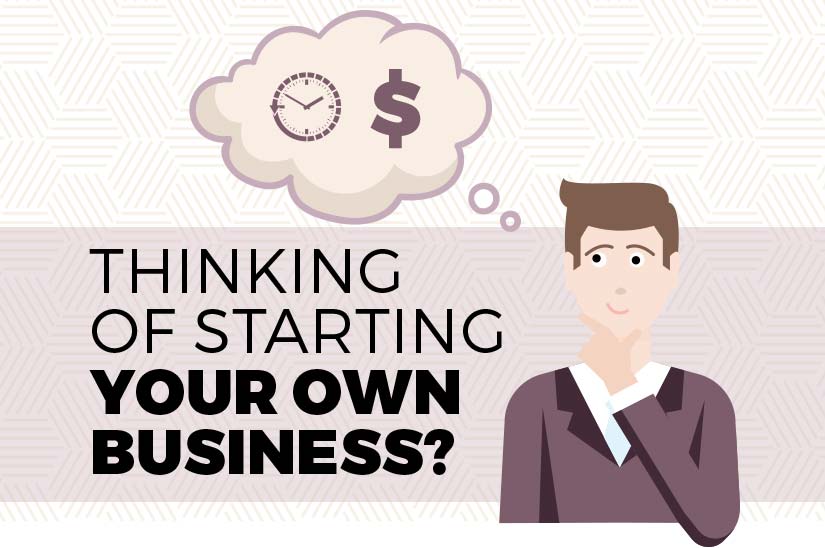
Are you thinking of starting your own business? It’s never too late to start a business. Starting a business is the beginning of an adventure of life.
The great thing about making your own business is that you are able to get your decision to what you want to do and where you’ll grow in future.
There are no restrictions on who want to be a great entrepreneur. You don’t really need an advanced college degree, a bunch of money in your bank or even a business experience to start something that could become the next major success. However, you do only need a solid business idea and implementation it in a proper way to get success.
But you might not know how to start your business empire.
That’s the reason why we are here.
Look out these 10 simple steps for starting a business. It will help you how to turn your big idea into a successful business.
1.Evaluate yourself

Let’s begin with the most essential inquiry that, Why would you like to start your own business? Be genuine and honest with your answers.This will make an establishment for all that you do pushing ahead, so it’s smarter to know reality now than later.When you have the reason, start posing yourself even more questions to help you figure out what type of business you should start.
Endless people dreaming of becoming entrepreneurs, but they never do. They’re facing with excuses and fears of failing. But excuses only keep you down from reaching your goals. Get a solution to that issue rather than let it hold you back to get your objective.
Let’s do it, being your own boss is hair-raising.Mostly, new business owners have a lot to lose with little insight into their chances of success. Stressing about the risks of business ownership is normal.
2.Get a Business idea
Do you already have a killer business idea? If so,congratulations! You can proceed to the next section. If not, there are a huge number of approaches to get your business idea.
Consider your talents, experience, and knowledge when selecting a business idea. If you have a particular skill set or talent, consider how these resources can be applied on your idea to fulfill market demand. Combining skill and knowledge with a market demand increases your faith of having a successful business idea.
Do you have a business idea that isn’t totally new? If so,consider the present contributions and spotlight on how you can make something better, less expensive or quicker.
And also, go out and meet individuals and ask them inquiries, seek advice from other business owners, explore thoughts on the web or utilize whatever strategy sounds good to you.
During the idealization phase, you need to iron out the major details. If the idea isn’t something you’re passionate about or if there’s not a market for your creation, it might be time to brainstorm other ideas.
3.Make your Business plan
Once you get your business idea then an important step is preparing a business plan in order to make your business idea a reality.
A business plan is a blueprint that will help to define what do you think you need to launch your business, large or small. It defines the sense of your business in a single document. It also creates a road map for investors, bankers, and other interested parties to use when you need financial support from outsiders. By creating your business plan you can get finance easily.
Here’s what we suggest that should be in your business plan:
- Business Name: Start with the name of your business, which is the most essential part of your business.
- Business description: What type of business do you want to start? How does your industry look like? What is your mission and vision of your business?
- Marketing strategies: what is your target market, and how can you capture to that market?
- Development plan: What is your product or service and how will you develop? After that, create a budget for that product or service.
- Operations and management : Here we have to show that, how does your business runs smoothly on a daily or monthly basis?
- Competitor analysis: Find your competitors and What are the strengths and weaknesses of their? How will you compete them?
- Finance factors: How much money do u need to start your business And What is the source of Money that you are invested in your business.
A business plan helps you to figure out where your company is going, and how it will overcome difficulties and what will be your future plan about your business.
4.Plan your finance
Starting a small business doesn’t need require a lot of money, However it includes some initial investment as well as the ability to cover ongoing expenses before you are turning a benefits.
Set up together in a spreadsheet that computes the one-time startup costs for your business (licenses and permits, hardware equipment, legal fees, insurance, branding, market surveying, inventory, trademarking, grand opening events, property leases, etc.), as well as what do you anticipate you will need to keep your business running for at least 12 months (rent, utilities, marketing and advertising, production, supplies, travel costs,worker compensations,your very own pay, and so on.)
Those numbers combined is the initial capital that you will require.
If you are thinking about getting finance you should finish some budgetary estimates in advance to give to your financial specialists or investors.
Once you know how much startup funding you’ll need, it’s time to figure out how you’ll get it.
Now that you have a rough estimated number in mind, there are various ways you can fund your venture, including:
- Self-funding
- Investors
- Bank Loans
- Loans through Govt. Scheme
- Friends And Family
5.Decide your legal business structure
Before registering your business, you need to decide what kind of entity it is.
Your business can be a sole proprietorship, a partnership, a limited liability company (LLC).The business entity you choose will impact many factors from your business name, to your liability, to how you file your taxes.
You may pick an initial business structure, and afterward re-evaluate and change your structure as your business develop and needs change.
- A sole proprietorship, if you will be running your business on your own.
- A general partnership, if you will be running your business with a co-partner.
- A limited liability partnership (LLP), where no partner is liable for another’s negligence. This hybrid structure has the ligament insurance of a business while allowing for the tax benefits of a partnership.
Eventually, it is dependent upon you to figure out which kind of substance is best for your present needs and future business objectives.If you’re struggling to make up your mind, it’s not a bad idea to discuss your choice which you have taken with a business consultant or legal adviser.
6.Register your business
Your business name assumes a job in pretty much every part of your business, so you need it to be a decent one. To become an officially recognized business entity, you must enlist with the government.
Register your business to make it a distinct legal substance. How and where you need to register it depends on your business structure and location of business. If you don’t enlist your business, you could miss out on personal liability protection, lawful advantages, and tax benefits.
Don’t miss to register your domain name once you have got your business name.
7.Get required licences and permits
Paperwork is a part of the process when you are going into your own business venture.
There are a number of business licenses and permits that may changes to your situation, depending on what type of business you are starting and where you are located. You will need to research what type of licenses and permits required to apply to your business during the initial start-up process.
For Example- MSME Registration, Start-Up India, Local Municipality etc
While some things you can do on your own, it’s best to consult with a legal advisory when beginning, so you can make sure you’ve covered everything that you require.
8.Set up your account System
Every business run most effectively and smoothly when there are all systems in one place. One of the most important systems for a business is an accounting system.
Your accounting system is required in order to create and manage your cost, set your rates and prices, lead business with others, and file your taxes. You can set up your accounting system yourself, or contract an accountant.
Open a Business bank account separately which helps in future to get a loan to grow your business. Current Account will help business to apply for loans, subsidies, Govt projects etc.
9.Find your location & launch your business

Your business plan has been finalized, the money is in the bank, and you’re ready to go. Now Setting up your place of business is most important for the operation of your business venture, whether you will have a home office, a mutual or private office space, or a retail space.
You will need to rethink about your location, hardware equipment, and overall setup, and ensure that your business location works for the type of business you will be doing. You will also need to reconsider if it makes more sense to buy or lease your business space.
Your business location will manage what type of customer you want to attract, what types of promotions you can run, and how long it will take you to grow. While a great location won’t necessarily guarantee your success, a bad location can be the reason to failure.
Launch your product or your service, when your services are completely worked out and prepared to go, hold an exceptional event to launch your business. Convey a press release, announce it to the world. Tweet it, Facebook it, let the word resound to all corners of your market that you have a new business.
Hold a party and welcome individuals, who can spread the word for you.
10. Advertise & Grow your business
Once your business is setup and running, you’ll need to start attracting clients and customers. You have to start with the basics by writing a unique selling proposition and creating a marketing plan. Then, explore as many business marketing ideas as possible so you can decide how to promote your business most successfully.
Many businesses come up with a great business idea and then fail to capture the market. You need to get out from it and spread the word about your product or service to the right people to generate business. Advertising and selling are part of the process however there is significantly more included.
In Growing Part, Your launch and first sales are only the beginning of your task as an entrepreneur. So as to make a benefit and remain above water, you generally should develop your business. It will need some time and effort.
Working together with increasingly settled brands in your industry is an incredible method to accomplish development. Connect with different organizations and even influential bloggers and ask for some promotion in exchange for a free product sample or service.
Now a days digital marketing become the most successful marketing Strategy to grow your business. To know more about digital marketing follow this article: How digital marketing helps to grow your business?
Conclusion
Once you have finished these business start-up activities, you will have all of the most important bases covered. And keep in mind that success doesn’t come overnight. Use these above 10 simple steps to start your business successfully, the plan you’ve created to consistently work on your business, and you will increase your chances of success.
Be open-minded and creative, look for opportunities, and follow above all these easy steps, have fun, good time.
Also share your feedback by commenting below and share with your entrepreneur friends.
Very well written post! The mentioned points are worth reading and informative. I have had a great time reading this post and looking forward to reading more such blog posts from your end in the future.
Very informative thank you